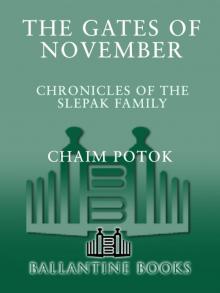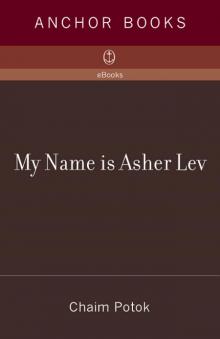- Home
- Chaim Potok
The Promise Page 15
The Promise Read online
Page 15
Rav Kalman slowly put out his cigarette in the ashtray on the desk. He brushed tiny specks of ashes from the top of his Talmud. He gazed at Abe Greenfield. “You have a mathematics examination,” he said, his voice very cold. “You came unprepared to the shiur because of a mathematics examination?”
“It’s a final,” Abe Greenfield said. He was looking at Rav Kalman now. His face was pale but his lips had drawn tight. I looked around quickly. Everyone was staring at him. Abe Greenfield was the quietest student in the class. He had sat in that same seat for almost a year and a half now and had not said a word, except when called on to read. He was something of a genius at math. He had received a fellowship to the Massachusetts Institute of Technology but had decided to do his graduate work at Hirsch and go on for smicha at the same time. He had wide glasses and large eyes and a somewhat pimply face. He was shy, withdrawn. He came and went in silence. He never spoke unless spoken to first, and then he responded haltingly, with a fixed smile on his thin lips and without gazing directly at the person to whom he spoke. Now he was staring at Rav Kalman. “This is the first time I’m unprepared,” he said.
“The first time?” Rav Kalman said.
“Yes.”
“I could understand if you were sick.”
“I wasn’t sick.”
“For mathematics you take time from the study of Torah?”
Abe Greenfield said nothing. He scratched at the side of his face and sat there, staring back at Rav Kalman and saying nothing.
“How does one do such a thing?”
Abe Greenfield said nothing.
“How does one dare do such a thing?”
I saw Abe Greenfield sit up very straight in his seat then. His eyes seemed to bulge slightly behind his glasses. Still he said nothing.
“You made a choice, yes?” Rav Kalman said coldly. “You had for yourself a choice between the Gemora and mathematics, and you chose mathematics. Yes? You understand what it is to make a choice, Greenfield? A choice tells the world what is most important to a human being. When a man has a choice to make he chooses what is most important to him, and that choice tells the world what kind of a man he is. You understand me, Greenfield?”
Greenfield said nothing. I watched his hands. They were clenching and unclenching on top of the Talmud. There was a fixed, empty smile on his face now.
“So, Greenfield, you have told us what is most important to you. Between Gemora and mathematics, you chose mathematics.”
Abe Greenfield said nothing. The room was deathly still.
“It is important to choose,” Rav Kalman was saying. “A man must be forced to choose. It is only when you are forced to choose that you know what is important to you. It is very clear, Greenfield, that the Gemora is not as important to you as mathematics.”
Abe Greenfield scratched at a pimple on his face. “It’s a final exam,” he said. “It’s the only time I’ve ever come unprepared.” His face was tight but his voice came out whining.
“You made a choice,” Rav Kalman said. “Yes? You made a choice.”
Abe Greenfield squirmed on his seat.
Rav Kalman came right up to Abe Greenfield’s desk and peered down at him. I wished he would leave him alone. He had made his point. Why couldn’t he leave him alone now? Leave him alone, I thought. Can’t you see how miserable he feels?
“Tell me something, Greenfield. You are trying to get a doctorate in mathematics?” He pronounced it “duk-tu-rot,” with a hard “r.” And he said it derisively.
“I’m trying,” Abe Greenfield said in a tremulous voice.
“And how much time does it take to get a dukturot?”
“Years.”
“Years. It takes years. And in all those years, how much time do you take from the study of Torah?”
Abe Greenfield said nothing.
Leave him alone, I thought. For God’s sake, leave him alone. Of all the people to pick on.
“How much time do you take, Greenfield?”
Still Abe Greenfield said nothing. But a flush was rising on his face.
“You have no tongue? What happened to your tongue?”
There was a cruel relentlessness to him, and I found myself beginning to be angry. Choices. He had written about forcing people to make choices. I had read that in his book on ethics two nights ago during the subway ride over to Danny: “A man must sometimes be forced to make choices, for it is only by his choices that we know what a man truly is.”
“How much time do you take, Greenfield?”
“What do you want from me?” Abe Greenfield said quietly.
“What do I want from you?”
“I studied for a math exam. Why is that so terrible?”
“You have made a choice.”
“I don’t know what you’re talking about. I made a choice. Once I didn’t come prepared. Once. In a year and a half, I didn’t come prepared once.” His voice was rising. “What do you want from me? You’re shaming me in public. You’re shaming me in front of the whole class. What do you want from me?”
Rav Kalman gazed down at Abe Greenfield. He seemed surprised.
“It’s wrong to shame someone in front of others. Why do you shame me like this?” His voice was quite high now, not loud, but high, straining. “You’re making an example of me. You’re using me. I’m not a child. We’re not children. This isn’t a European ghetto. You can’t use me like that. You should apologize. You committed the sin of shaming me in public. You should at least apologize.”
Rav Kalman stared at him.
“Apologize,” Abe Greenfield said.
“Enough!” Rav Kalman shouted. “This is how you talk to your teacher?”
“You won’t apologize?”
“Enough!”
“You won’t apologize?”
Rav Kalman stared at him out of dark, narrow eyes and seemed unable to respond. His face was quite pale around the black beard. He put a finger to the knot of his tie, then went quickly to his desk and lit a cigarette. He held the cigarette in his fingers. His hands were shaking.
“You won’t apologize?” Abe Greenfield said, his voice still rising. His eyes were wide and he was sitting on his seat, staring straight at Rav Kalman. Then he got slowly to his feet.
“Stop picking on me,” he said, his voice suddenly very low.
Rav Kalman stared at him. There was a stir from the class.
“Stop picking on people,” Abe Greenfield said, standing there among the front row of seats and looking fixedly at Rav Kalman. “Stop picking on people,” he repeated.
“What does he say?” Rav Kalman asked, looking at the class. He did not understand the English expression to pick on someone.
“Pick on someone else. Pick on the goyim,” Abe Greenfield said. He looked as though he no longer knew what he was saying.
“Respect,” someone said loudly behind me in Yiddish.
“Sit down,” someone else said.
“Leave us alone,” Abe Greenfield said. “Scream at the goyim.”
“How do you talk this way?” Rav Kalman said, trembling.
“How do you talk this way? How do you talk this way?” Abe Greenfield was imitating Rav Kalman in Yiddish. Then he went back to English. “I should have gone to the Massachusetts Institute of Technology. But my father wanted me to get smicha.”
There was an angry murmur from the class.
“Sit down, Greenfield,” Rav Kalman said. His voice shook. He seemed a little frightened. He touched the knot of his tie again and put the cigarette out in the ashtray with quick, nervous jabs. There were ashes on the desk. He ignored them. He seemed not to know what to do with Abe Greenfield.
“Sit down,” someone in the class said again.
But he stood there, tense and taut and a little wild-looking. “You wasted ten minutes just now. You wasted hours all this year and last year. That’s taking time from the study of Torah.”
There was a loud stirring from the class. The student sitting to the right of Abe Gr
eenfield tugged at his sleeve to get him to sit down. He shook off his hand.
“Shah!” Rav Kalman shouted at the class. He turned to Abe Greenfield. “Sit down,” he said quietly. His voice was strangely soft. “Sit down,” he said again. “I did not mean to upset you.”
Abe Greenfield stared at him. I saw him blink his eyes. He seemed to come suddenly awake. He looked quickly around the room and became aware that he was the only one standing. He stared at the eyes that were staring at him. A look of enormous astonishment came over his thin face. Slowly, he sank into his seat and looked down at his open Talmud. I could see his hands trembling. Then, with an abrupt movement of his right hand, he closed his Talmud. He got to his feet and picked up the Talmud. His eyes were wet. He went through the room, stiffly and with dignity. The door closed quietly behind him.
There was a long moment of frozen silence. The rain fell loudly against the windows. Bedford Avenue looked drained of color, its asphalt glistening darkly in the heavy rain.
Rav Kalman pointed a finger at me. “Malter, go outside and see if he is all right.”
I got quickly to my feet and walked between the chairs to the door.
“Malter.”
I turned.
“Bring him back inside if he is all right. Tell him I asked that he come inside.”
I went out into the corridor. He was not there. I went quickly through the marble entrance hall and pushed open the metal front doors and put my head outside. I felt the cold rain on my face. He was not anywhere in sight. I went back along the corridor and into the synagogue. I found him in the synagogue at one of the long tables near the coat racks. The synagogue was empty. Everyone was in class. We were the only ones there. He sat at the table and stared at the wall beyond the coat racks. He held his head in his hands and stared at the wall. I sat down next to him.
“How do you feel?”
He looked at me.
“Are you all right?”
He looked at me and did not seem to see me.
“Rav Kalman sent me to find out if you were all right.”
He blinked. His pimply face was sallow. He looked a pathetic figure and seemed on the verge of tears.
“What did I do?” he said. “I just killed myself.”
“Don’t be silly.”
“I didn’t know what I was saying. My God, what did I do? My father will have a heart attack when he finds out.”
“He doesn’t have to find out.”
“The whole world will know. How can he not find out? What did I do? It was like a dybbuk suddenly got into me. What did I do?” He was a graduate student in mathematics and he was talking about a dybbuk.
“Do you want some water?”
“Why did I do that? I don’t understand why I did that. Something broke inside me. I could feel it break. It was a dybbuk. A dybbuk came inside me.”
“You lost your temper.”
“I just killed myself. How can I go home? My God, what happened to me?”
“Nothing happened to you. You lost your temper. Calm down. You’ll be a wreck for your math exam if you don’t calm down.”
He looked at me.
“The math exam,” I said. “You don’t want to mess up your math exam.”
“That’s right,” he muttered. “You’re right.”
“Okay,” I said.
He took out his handkerchief, wiped his eyes and blew his nose, and put the handkerchief away.
“You feel better now?”
“Yeah.”
“Then let’s go back in.”
He looked at me, startled.
“Rav Kalman asked me to bring you back inside.”
“Are you crazy? I can’t go back in there.”
“Yes you can,” I said.
“I can’t go in there. What can I say to him?”
“You’ll apologize after the shiur.”
“Leave me alone. I can’t go.”
“Come on,” I said. I took his arm.
“Leave me alone.”
“All right,” I said. “Are you through with Hirsch? Finished? All through? Because you lost your temper once? Because if you don’t go back in you are through.”
He stared at me miserably.
“Come on,” I said.
“He’ll cripple me if I go back in there.”
“He’ll cripple you if you don’t.” He got slowly to his feet.
“You’ll sit and you’ll listen and you’ll tell your dybbuk to stay the hell away. All right?”
He stared at me and did not say anything.
“Come on,” I said quietly.
He walked alongside me, carrying his Talmud. We came together into the class. I saw heads turn. Rav Kalman was explaining a passage. He did not look at us. Abe Greenfield slid into his seat and opened his Talmud. Rav Kalman went on explaining. I took my seat. Everyone’s eyes went back to Rav Kalman. He did not once look at Abe Greenfield. Someone else was reading now, a student in the back row. He read and answered questions. I forced myself back into the passages of Talmud. I sat there and listened and remembered Rav Kalman talking about choices and fought to keep my mind on the Talmud. A quarter of an hour before the end of the shiur he called on me to read a difficult three-line passage. He was asking me for the third time to explain the words when the bell rang. He dismissed us. Abe Greenfield remained behind as the class quickly emptied.
Half a dozen of us waited near the coat rack for almost twenty minutes until he came back into the synagogue. There was a grim look on his face.
“Well, he didn’t cripple you,” I said.
He reached for his coat.
“What happened?” someone asked.
“I apologized.”
“For twenty minutes?”
“He gave me a musar message.”
“Are you still in the class?” someone else asked.
He nodded gloomily.
“What did you do that for? You were crazy to do that.”
Abe Greenfield put on his coat and hat. “I got a math exam,” he said. “I got to go.”
“What did you do that for? Why didn’t you say you were sick?”
“I don’t lie,” Abe Greenfield said with dignity.
“What was the musar message?” I asked.
“Respect for teachers. And to make choices for Torah.”
“That’s all?”
“Yeah. He was very nice about it.”
“Nice?” someone said. “Nice?”
“I got to go,” Abe Greenfield said.
We watched him walk from the synagogue.
“What a jerk,” the one next to me said. He used the uncomplimentary Yiddish word.
“Don’t talk like that,” Irving Goldberg said. He had been standing there all the time, silent and solemn.
“He’s a jerk.”
“That’s dirty talk,” Irving Goldberg said, using the Talmudic term “nibul peh.”
“He’s still a jerk.”
“Rav Kalman was nice,” someone else said. “Did you hear, Reuven? Rav Kalman was nice.”
“I heard.”
“He wasn’t thrown out of the class, so Rav Kalman was nice.”
“Maybe the Messiah has come,” another student said. “Maybe we ought to look out the window. Does it say anywhere the Messiah will come when it rains?”
I was suddenly weary of their talk. I put on my coat and hat. I wanted to get away from there. I wanted to sit in my logic class and forget Rav Kalman. I went quickly from the synagogue. Passing Rav Gershenson’s classroom, I glanced through the small window in the door. He was sitting behind his desk and as usual about half a dozen students were standing intimately around him. I could hear his gentle voice through the door.
Outside I felt the cold winter rain on my face and raised the collar of my coat. The asphalt street was black and glistening. There were puddles on the sidewalk. A bus went by close to the curb and sprayed water onto my shoes. I turned into the adjoining brownstone and started up the stairs to my l
ogic class. I was ten minutes late.
I sat near the window and listened to the rain and stared at the blackboard, which was being rapidly covered with symbols by my logic professor, a tall, dignified-looking man in his forties. He had a brown mustache and wore a tweed suit, and he spoke softly as he wrote on the board. I listened to him talk and copied symbols into my notebook and thought of Rav Kalman. I was sick of Rav Kalman, sick of being picked on, sick of watching him pick on others, sick of the oppressive Eastern European ghetto atmosphere of his class, sick of his fanatic zeal for Torah. I had about four months left until the smicha examinations. That was a long time. I would control myself and be very careful. I would take the examinations and be done with him. But I would have to be very careful in class. I sat there and thought a while longer of Rav Kalman, and then began to forget Rav Kalman because an interesting problem in logic was being put on the blackboard, and soon I had forgotten completely about Rav Kalman and was lost in the convolutions of set theory.
There was a message for me on the telephone stand in the hall when I got home that evening. Danny had called a few minutes earlier and wanted me to call him back at the apartment. The message was in my father’s handwriting. I could hear his typewriter going in the study. He had begun working on another article. I put away my hat and coat and dialed Danny’s number. The phone was picked up after the first ring. Danny had arranged for me to visit Michael next Sunday at three o’clock. Was that okay? It was okay, I said.
“How is he?” I asked.
“You’ll see for yourself.”
“Are you working with him?”
“Yes.”
“Well?”
“I don’t know.”
“What do you mean, you don’t know?”
“I’ve only had him once.”
“How was it?”
“He talked about you the whole hour.”
“Are you seeing him again?”
“Tomorrow.”
“Will you be there on Sunday?”
“No. Look, I’ve got to run. I’ve got a seminai in half an hour.”
I hung up the phone and stood there a long time, staring down at it. Manya called us in to supper. I washed my hands and sat down at the kitchen table. My father was lost in thought, his mind on the article he was writing. I was not hungry. But I ate. With Manya inside that kitchen I always ate, whether I was hungry or not.

 The Gift of Asher Lev
The Gift of Asher Lev The Gates of November
The Gates of November In the Beginning
In the Beginning Davita's Harp
Davita's Harp I Am the Clay
I Am the Clay The Promise
The Promise The Chosen
The Chosen Old Men at Midnight
Old Men at Midnight My Name Is Asher Lev
My Name Is Asher Lev